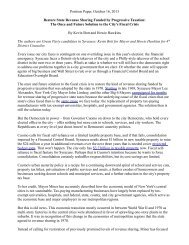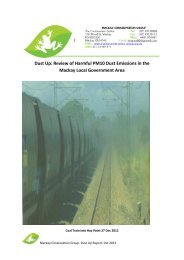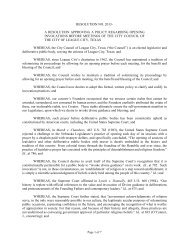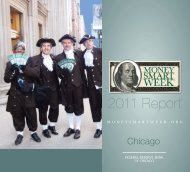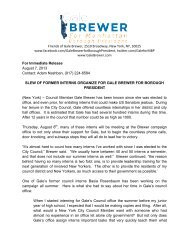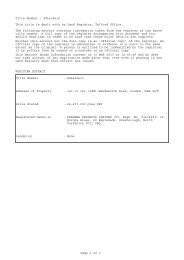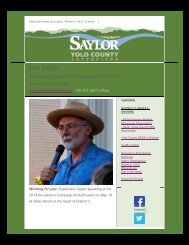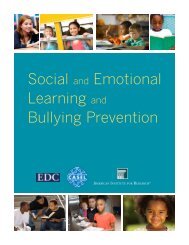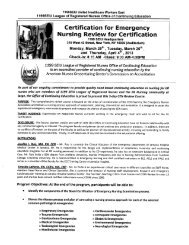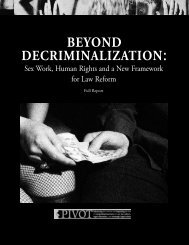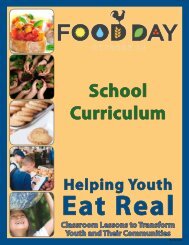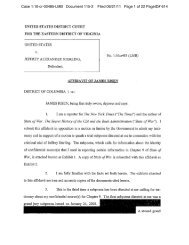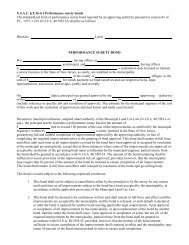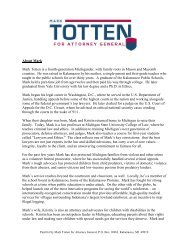Create successful ePaper yourself
Turn your PDF publications into a flip-book with our unique Google optimized e-Paper software.
Lesson 5: Be an Advocate<br />
— Getting Started —<br />
Overview<br />
In this final lesson, you and your students will come<br />
up with ideas and create a plan to make a change in<br />
the food environment that will make it easier for your<br />
community to meet the <strong>Food</strong> <strong>Day</strong> Eating Goals. Even<br />
though this is the last lesson in the <strong>Food</strong> <strong>Day</strong> series,<br />
it is really the launching of what we hope will turn<br />
into a short or long-term project where you, your<br />
students, and your entire school community become<br />
advocates for positive change. You and your students<br />
will brainstorm several ideas for community change<br />
plans. Then, you will create a list of steps it will take<br />
to carry out your plan and explain each step, with a<br />
timeline for when you will complete each step. You<br />
will also discuss how you will track your progress and<br />
what data you can collect to determine if your plan is<br />
successful at making it easier for your community to<br />
meet the <strong>Food</strong> <strong>Day</strong> Eating Goals.<br />
Behavior Change Objective<br />
As a result of this lesson, students will create and<br />
implement a plan that will make positive changes to<br />
the food environment in their community.<br />
Learning Objectives<br />
Students will be able to:<br />
• create a list of potential ideas to change their<br />
community to make it easier to meet the <strong>Food</strong> <strong>Day</strong><br />
Eating Goals;<br />
• list and explain the steps needed to carry out an<br />
action plan for community change;<br />
• (once the plan is implemented) evaluate how<br />
effective they were at changing their community<br />
food environment to make it easier to meet the<br />
<strong>Food</strong> <strong>Day</strong> Eating Goals.<br />
Background for Teachers<br />
“Never doubt that a small group of thoughtful,<br />
committed, citizens can change the world. Indeed,<br />
it is the only thing that ever has.” You may have seen<br />
this quote by Margaret Mead many times before,<br />
but it bears repeating here. We can all try to meet<br />
the <strong>Food</strong> <strong>Day</strong> Eating Goals by navigating through<br />
the challenging food environment. However, if we<br />
want long-term, sustained change that will lead to a<br />
meaningful decrease in type 2 diabetes, heart disease,<br />
and obesity, as well as decreases in greenhouse gases<br />
and pollution created by our food system, we need<br />
an environment that makes meeting the <strong>Food</strong> <strong>Day</strong><br />
Eating Goals easy, affordable, and accessible to all.<br />
This lesson is about you and your class working<br />
together to launch a project to become advocates<br />
to make positive changes to the food environment<br />
in your community. This project could be as small<br />
or large as makes sense for your situation. When<br />
students help to co-create their activities for learning,<br />
they engage in deeper ways than they do with<br />
teacher-led lessons. As you create and implement<br />
your food environment change project, think about<br />
how you can connect what students are doing with<br />
this project across the various topics you are teaching<br />
during this school year. You might use math skills to<br />
determine the extent of the changes you make and<br />
science skills to collect and implement data. Students<br />
can conduct research and read resources to learn<br />
what others have done before and can write stories,<br />
poems, and conduct interviews to document their<br />
experiences. Be sure to log on at www.foodday.org to<br />
post your project and check out various projects from<br />
around the country.<br />
To motivate you to get started on your project, here is<br />
a quote from Ted Kennedy, “We know the future will<br />
outlast all of us, but I believe that all of us will live on<br />
in the future we make.”<br />
<strong>Food</strong> <strong>Day</strong> Lessons | 61



